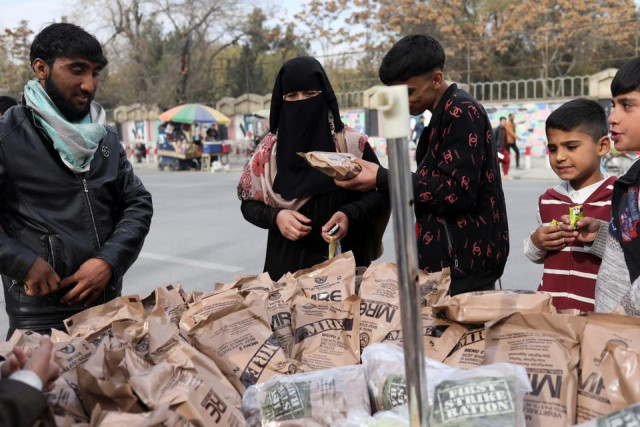UN pushes cash handouts to avert mass poverty in Afghanistan
The UN World Food Programme has said 22.8 million people are facing acute food insecurity

The United Nations said on Wednesday that a program to pay $300 million a year in cash to Afghan families with children, elderly or people with disabilities is the best way to target increasing poverty.
In what the U.N. Development Programme (UNDP) described as an "alarming" socio-economic outlook for Afghanistan for the next 13 months, it also pushed a $100 million "cash for work" project to boost employment and $90 million in small business payments.
"This will be probably the best shot at halting this massive collapse into near universal poverty," UNDP Regional Director for Asia and the Pacific, Kanni Wignaraja, told Reuters.
As Afghanistan struggles with a sharp drop in international development aid after the Taliban seized power in mid-August, an economy and banking system on the brink of collapse, the COVID-19 pandemic and severe drought, UNDP has projected that poverty may become nearly universal by mid 2022 - affecting more than 90 percent of the country's 39 million people.
The U.N. World Food Programme has said 22.8 million people are facing acute food insecurity.
UNDP set up a special trust fund in October, with a 50 million euros ($58 million) pledge from Germany, to provide urgently needed cash directly to Afghans. So far, the fund has received pledges for $170 million.
The UNDP report makes the case for boosting a cash payment program, known as ABADEI, which was launched in October. Since then UNDP said it has made $100,000 in "cash for work" payments, creating jobs for 2,300 people in Mazar, Kunduz and Herat, and is being expanded to other provinces.
The report also warned that Afghanistan's economic growth will not turn positive in the near term unless restrictions on women working are lifted, $250 million a year in aid to combat COVID-19 continues and sanctions are eased to allow for humanitarian assistance.
It estimates that restricting female employment could cause an immediate economic loss of between $600 million and $1 billion - 3 to 5 percent of gross domestic product.
Wignaraja, who has met Taliban officials in Kabul, said a message needed to be sent that "all capable men and women should be fully back to work and contribute to your full potential to not only mitigate the immediate economic disaster, but think about this as the future of the country."



















COMMENTS
Comments are moderated and generally will be posted if they are on-topic and not abusive.
For more information, please see our Comments FAQ